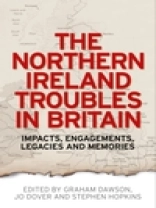This ground-breaking book provides the first comprehensive investigation of the history and memory of the Northern Ireland Troubles in Britain. It examines the impacts of the conflict upon individual lives, political and social relationships, communities and culture in Britain, and explores how the people of Britain (including its Irish communities) have responded to, and engaged with the conflict, in the context of contested political narratives produced by the State and its opponents. Setting an agenda for further research and public debate, the book demonstrates that ‘unfinished business’ from the conflicted past persists unaddressed in Britain, and advocates the importance of acknowledging legacies, understanding histories and engaging with memories in the context of peace-building and reconciliation.
Зміст
Introduction – Graham Dawson and Stephen Hopkins
Part I: Perspectives from the British State, politics and the military
1. ‘The truth, the whole truth…’: some British political and military memoirs of the Troubles – John Newsinger
2. ‘I got shot through the head with an Armalite round’ – Ted Aubertin
3. ‘A real stirring in the nation’: military families, British public opinion and withdrawal from Northern Ireland – Paul Dixon
4. The memoir-writing of the Wilson and Callaghan governments: the Labour Party and constitutional policy in Northern Ireland – Stephen Hopkins
5. British questions – Geoffrey Bell
6. ‘The coach never arrived back at its destination’ – Jenny Mc Mahon
7. Serving in troubled times: British military personnel’s memories and accounts of service in Northern Ireland – K. Neil Jenkings and Rachel Woodward
Part II: Anti-state activisms
8. Something in the air: the rise of the Troops Out Movement – Aly Renwick
9. Memories of Sinn Féin Britain, 1975-85 – Susan O’Halloran
10. Policing the Irish community in Britain – Nadine Finch
11. ‘Not our cup of tea’: Irish and British feminist encounters in London during the Troubles – Ann Rossiter
12. Political delegations of women from Britain to the North of Ireland and the campaign against strip searching in the 1980s – Di Parkin
Part III: Culture and the representation of the Troubles
13. ‘Every man an emperor’: the British press, Bloody Sunday and the image of the British Army – Greg Mc Laughlin and Stephen Baker
14. Suspect stories: William Trevor’s portrayals of the Irish in London during the Troubles – Tony Murray
15. Writing as survival – Maude Casey
16. The ‘oxygen of publicity’ and the suffocation of censorship: British newspaper representations of the British broadcasting ban (1988-94) – Max Pettigrew
17. ‘The Troubles we’ve seen’: film, television drama and the Northern Irish conflict in Britain – John Hill
Part IV: Memory, peace-building and ‘dealing with the past’
18. Responding to the IRA bombing campaign in mainland Britain: the case of Warrington – Lesley Lelourec
19. ‘There’s no way out but through’ – Annie Bowman
20. The Birmingham pub bombings, the Irish as a ‘suspect community’ and the memories of the O’Reilly family – Laura O’Reilly
21. ‘Truth recovery’ and the role of the security forces in the Northern Ireland Troubles – Aaron Edwards
22. Commemorating bonds of Union: remembering the Ulster Special Constabulary at the National Memorial Arboretum – L. J. Armstrong
23. ‘I’d find a way to contribute to peace’ – Jo Berry
24. Performance practices and conflict resolution: Jo Berry and Patrick Magee’s Facing the Enemy – Verity Combe
Index
Про автора
Graham Dawson is a Reader in Cultural History at the University of Brighton. His research has focused on the inter-relations between cultural memory, narrative and identity, and on the memory of war in modern times. He is author of Soldier Heroes: Briti












